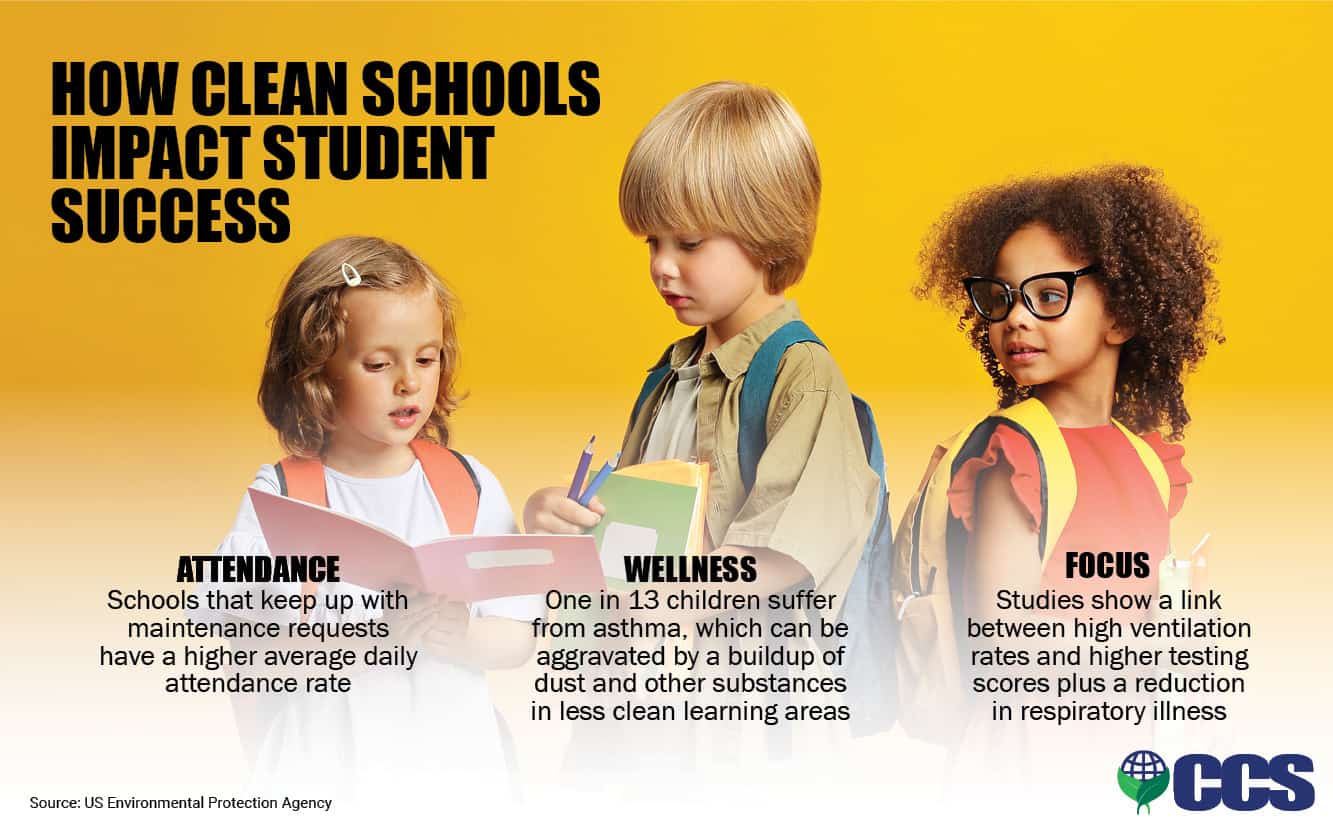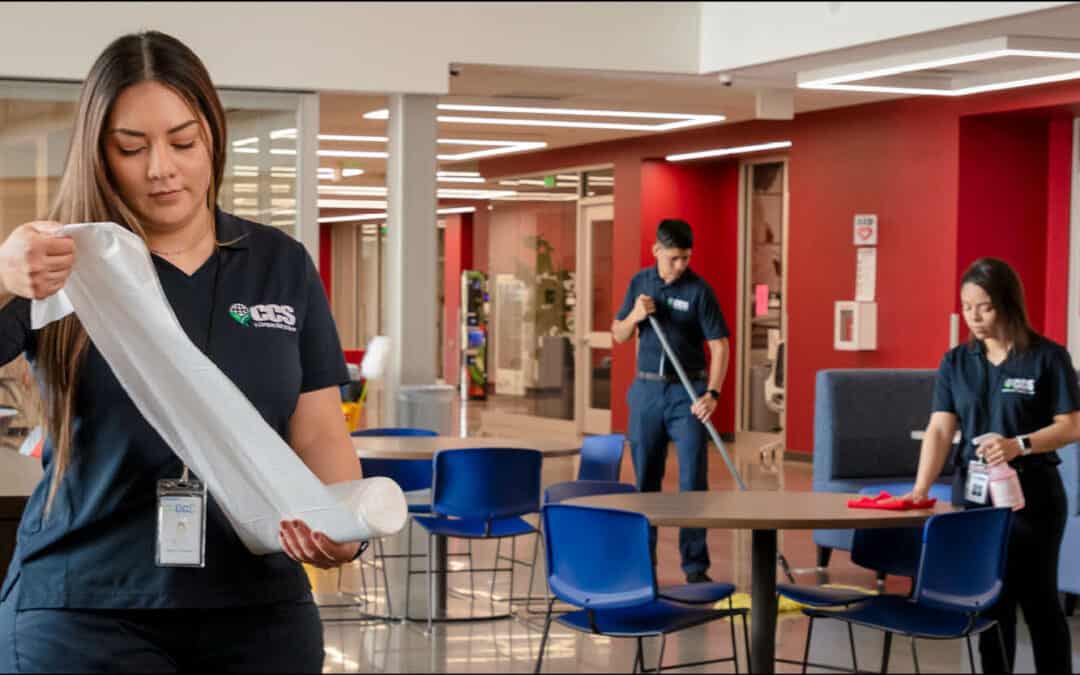Proper cleaning and maintenance in schools can make a meaningful impact on educational success for both young learners and teachers. Consistent, thorough cleaning to protect against any infectious disease – not just COVID-19 but also norovirus or the flu – can enhance the success rate of everyone on campus. Taking a deeper look at how aspects of educational life are affected by great cleaning and facility maintenance can give school leaders a better understanding of what is at stake when planning for the scope of custodial and building engineering services.

Students’ ability to focus on learning is the top priority for any educational institution. The U.S. Environmental Protection Agency (EPA) has collected and shared dozens of studies and resources documenting the correlation between facility cleanliness – and notably air quality – and academic performance. The EPA states: “Airborne or surface-level dust affects health, and housekeeping protocols that thoroughly remove dust from surfaces have a positive impact on health.”
Teachers and other staff also face an elevated risk when educational facilities lack thorough cleaning. School staff members interact with dozens – or sometimes hundreds – of students every day, and they need to be able to work in a clean space that does not distract from educational efforts or impact anyone’s health. Clean classrooms can lead to fewer teacher sick days and therefore improved classroom continuity. Per the EPA: “Student performance also can be affected when teachers are absent due to illness.” Additionally, the National School Boards Association comments that “when schools have effective policies and practices that support the health of their students and staff, absenteeism decreases, concentration improves, and behavior problems are reduced.”
The presentation and upkeep of school buildings also play a role in how students perform in the classroom. According to studies collected between the late 90s to early 2000s, schools with backlogs on maintenance requests were found to have lower daily attendance rates, while schools that were able to perform timely upkeep saw a boost in standardized testing scores.
There is an increased understanding in recent years of the impact of proper ventilation in educational buildings. School-aged children are particularly at risk when it comes to poor air quality, with the EPA stating that “children breathe more air, eat more food and drink more liquid in proportion to their body weight than adults. Therefore, air quality in schools is of particular concern.” Improper airflow can result in both short- and long-term effects on student and teacher health. This includes headaches, coughing, eye sensitivity, and exacerbated asthma. Children are more susceptible to the latter, with one in 12 children experiencing asthma according to the Centers for Disease Control and Prevention. In a landmark study recently published by The Center for Green Schools, data collected during the COVID-19 pandemic shows that most K-12 schools are struggling with their indoor air quality (IAQ), noting “the most frequently cited challenge to implementing protective air quality measures at schools was that school buildings were not designed to support the strategies that were being recommended.” Understandably, factors like building structure and budgetary constraints impact a school’s ability to pursue improved air quality measures.
Cleanliness and air quality also can be a factor in teacher attrition. In a 2002 survey “Schneider, M. 2002. ‘Public school facilities and teaching: Washington, DC and Chicago,’ 80 percent of educators surveyed who graded their overall school conditions a “C” or below would consider changing schools, and poor air quality was cited most often for teachers’ low grades for their schools.
Schools’ main line of defense against infectious disease is the work performed by custodial staff. When considering custodial services in classrooms, cafeterias, and other shared spaces to deliver maximum cleanliness, electrostatic cleaning is an effective tool as it can disinfect large areas while evenly coating hard-to-reach surfaces.
Originating in the 1940s, usage of electrostatic disinfection methods (such as foggers, sprayers, and vaporizers) has grown tremendously over the COVID-19 pandemic. Check out CCS’ video on how we perform electrostatic cleaning in schools and our article on electrostatic cleaning for more information on the practice.

Finally, switching to green cleaning procedures and products can prove beneficial for staff and student health. Many chemical cleaners can be harmful to children if not stored or used properly, making use of sustainable options a great alternative for schools without sacrificing cleaning quality. In addition, eco-friendly products are less environmentally impactful with minimal cost difference. CCS Facility Services’ Director of Corporate Workplace Safety, Wellness, and Innovation, Don Buffoni, shares: “There is virtually no downside to switching to green cleaning. It is important to distinguish yourself from the property next door, and green cleaning equates to a longer life for a facility. When working with vendors who use environmentally preferred supplies, product choice is very controlled and must meet certain certifications.” Programs such as LEED (Leadership in Energy and Environmental Design) provide roadmaps for facility managers looking to make the switch to environmentally healthier commercial cleaning practices for their campuses.

With a clear correlation between cleanliness and academic success, school and district leadership can approach custodial and maintenance needs with informed decision-making. At CCS Facility Services, we take our commitment to cleaning for health in classrooms and on campuses very seriously, and we have earned honors from authorities in the commercial cleaning industry for that commitment. We were the first in the world to receive GBAC STAR Service accreditation, presented by the Global Biorisk Advisory Council, which reflects CCS’ ability to deliver exemplary cleaning services to protect against the spread of infectious disease, as well as earning CIMS-GB certification multiple times, reflecting the depth of our commitment to sustainability in all aspects of our business and service to our customers. Visit our website for more information on our expertise in commercial cleaning and maintenance for schools and campuses.


